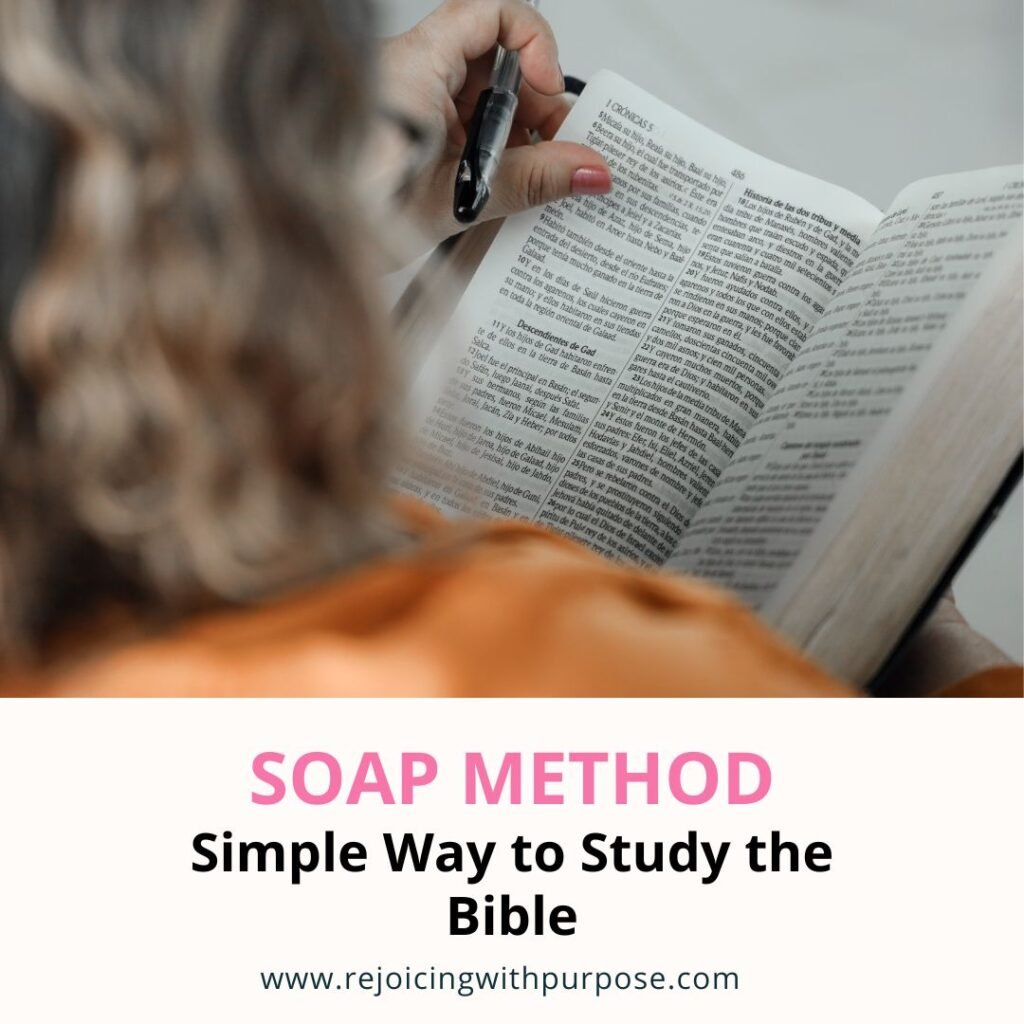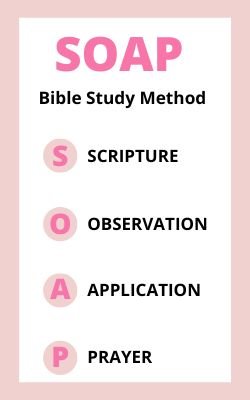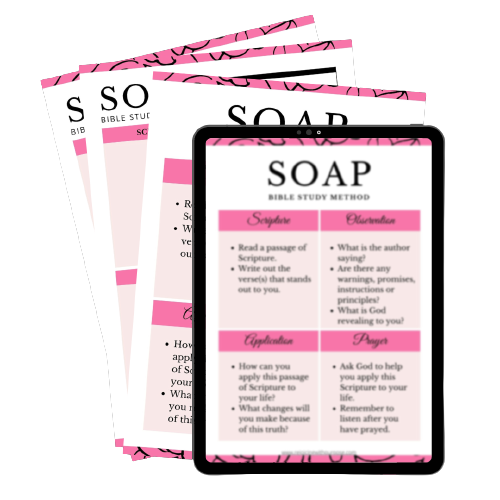
When I was younger and I thought about studying the Bible, I normally thought about going to a college or learning Greek and Hebrew. But as I got older, I realized that I could do it right in the comfort of my home using the SOAP method of Bible Study.
Why Should You Study the Bible?
Whenever I study the Bible, I always get more revelation than when I simply read it. The more I understand the Word, the more likely I am to apply it which inevitably leads to transformation. ⠀
Here are a few quotes that capture some of the reasons we should study the Word.
Study the Bible Quotes
- Study to shew thyself approved unto God, a workman that needeth not to be ashamed, rightly dividing the word of truth. (2 Timothy 2:15 KJV)
- Nobody ever outgrows Scripture; the book widens and deepens with our years. – Charles Spurgeon
- The Bible will keep you from sin, or sin will keep you from the Bible. – D.L. Moody
- The goal of Bible reading and study is worship. Not finding more rules to follow. Not finding reasons to feel good about ourselves. The goal is to see God in all his glory and to enjoy Him. – Katherine Forster
- Studying the Word leads to revelation and transformation – Verneisha
What is the SOAP Method for Bible Study?
SOAP is an acronym and each letter stands for the steps involved in the study method.

The SOAP method of Bible study is a simple way to study the Bible. It helps you to move beyond merely reading the Word to pondering and meditating upon it.
As you ruminate on the Word, you will get a deeper understanding and you will realize that it is applicable.
One of the advantages of using this method is that you don’t need to know Greek or Hebrew.
The main items you need are:
- A Bible
- Notebook/Paper
- Pens/Pencils
You can even use this method for devotional journaling.
Remember to start every study session with prayer. Ask God for revelation and understanding. All Scripture is inspired by Him so He is best One to help you interpret the Bible.
How to Study the Bible using the SOAP Method?
First Step: Scripture
Read a passage of Scripture. This could be a chapter of the Bible or part of a chapter.
Most Bibles have headings that break the chapters into smaller sections. Each section covers a specific topic or event. This will help you to know what part of the chapter you can read.
After you have read the passage, write out the verse(s) that stands out to you.
Second Step: Observation
Typically the observation step is done based on the verse(s) that stood out to you.
But you can also make your observations based on the passage that you read. If you make your observations based on the passage, it will help you to keep the context in mind.
You can make the observations in bullet points. Here are some questions that you can use to guide you as you write what you notice:
- What is the author saying?
- Are there any warnings, promises, instructions or principles?
- Are there any phrases that are repeated?
- What is God revealing to you?
The Observation step may require that you do some additional research to get even more from the passage. This could include taking the time to identify the author as well as the historical context.
You can also look for the meaning of words to ensure that you understand the passage.
Third Step: Application
James 1:22 tells us that we should not just merely listen to the word but we should do what it says.
Therefore you must apply the Word.
For this step, take the time to identify how you can apply the lessons from the Scripture to your life.
What changes will you make because of the lessons you have learned and the truth that has been revealed to you?
Fourth Step: Prayer
The final step is prayer. You have read the Word, made observations and identified lessons and ways to apply it.
Now it’s time to talk to God. Take some time to praise Him, thank Him and ask Him to help you apply His Word to your life.
Remember to listen after you have prayed.
Soap Method of Bible Study Example
Examples are one of the best ways to understand new concepts. Here is an example that illustrates how you can use the SOAP method of Bible Study to enrich your time with the Lord.
The passage of Scripture that I will focus on is Philippians 4:2-9 (NLT).
In the New Living Translation (NLT) Bible, this passage comes under the heading “Words of Encouragement” so I know that these verses are focused on providing encouragement.
Philippians 4:2-9 (NLT):
2 Now I appeal to Euodia and Syntyche. Please, because you belong to the Lord, settle your disagreement.
3 And I ask you, my true partner, to help these two women, for they worked hard with me in telling others the Good News. They worked along with Clement and the rest of my co-workers, whose names are written in the Book of Life.
4 Always be full of joy in the Lord. I say it again—rejoice!
5 Let everyone see that you are considerate in all you do. Remember, the Lord is coming soon.
6 Don’t worry about anything; instead, pray about everything. Tell God what you need, and thank him for all he has done.
7 Then you will experience God’s peace, which exceeds anything we can understand. His peace will guard your hearts and minds as you live in Christ Jesus.
8 And now, dear brothers and sisters, one final thing. Fix your thoughts on what is true, and honorable, and right, and pure, and lovely, and admirable. Think about things that are excellent and worthy of praise.
9 Keep putting into practice all you learned and received from me—everything you heard from me and saw me doing. Then the God of peace will be with you.
First Step: Scripture
The verses that stand out to me are Philippians 4:6-7.
Don’t worry about anything; instead, pray about everything. Tell God what you need, and thank him for all he has done. Then you will experience God’s peace, which exceeds anything we can understand. His peace will guard your hearts and minds as you live in Christ Jesus.
Second Step: Observation
So what did I notice in those verses? These are the notes that I made:
- Whenever something is bothering me or I am faced with trouble, cares or anxiety, I should pray instead of worrying.
- When I’m praying, I should be specific (“Tell God what you need”)
- Thanksgiving should be a part of my prayers.
- Once I stop worrying and once I tell God what I need and thank Him, then I will experience His peace
- God’s peace will protect my heart and mind
Third Step: Application
How can I apply these lessons to my life?
- Whenever, I realize that I am worried or anxious, I can stop that thought process THEN start praying about whatever is bothering me. Then I can rest knowing that the Omnipotent, Omniscient One is in control.
- I can develop a habit of giving thanks unto God for all that He has done.
Fourth Step: Prayer
God, I thank you for Your Word. I thank You for Your faithfulness and that You have always been with me each step of my life. I thank You that You can be trusted at all times. Help me to remember to pray instead of worrying. Help me to cast ALL my cares upon You knowing that You care for me. Thank You for Your peace that passes all understanding that guards my heart and mind in Christ Jesus. In Jesus’ Name I pray. Amen.
Takeaway
I hope you found this helpful. You can use the SOAP method for Bible Study to delve into the Word. You can also use it for devotional journaling during your quiet time with the Lord.
This is a simple method that is beginner-friendly. As you grow, you can explore other methods and study chapters of the Bible, characters and themes and topics.
Here are FREE Bible Study Sheets to get you started.
